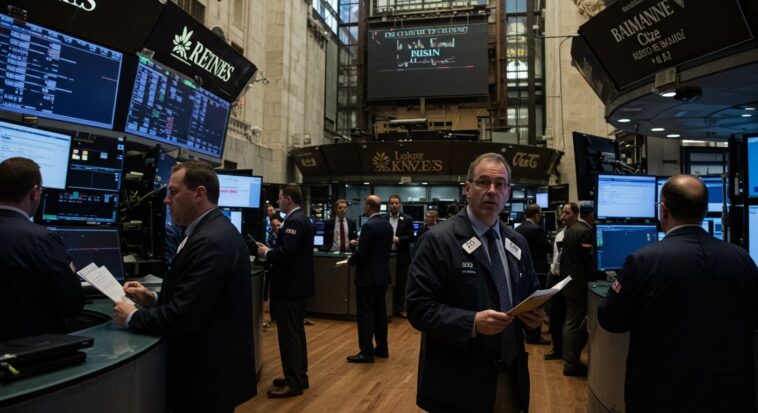A disappointing U.S. jobs report sent shockwaves through the stock market on Thursday morning, triggering a widespread selloff across various sectors, including tech hardware, satellite communications, and telecoms, as concerns about a slowing economy took the spotlight.
The report revealed that the U.S. economy added a mere 73,000 jobs last month, significantly lower than the 170,000 that economists had predicted. To make matters worse, revisions to the data for May and June erased 258,000 jobs that had previously been reported. Professional and business services, a cornerstone of white-collar employment, lost 14,000 positions, raising alarms for corporate America.
“This kind of slowdown in hiring, especially in services, indicates that the labor market is no longer the resilient engine it used to be,” noted Diane Keller, a senior economist at Orion Capital Partners. “For the Fed, this could be a crucial turning point.”
The disappointing figures quickly raised expectations that the Federal Reserve might consider cutting interest rates as soon as next month.
Tech and Telecom Stocks Lead Declines
The market reacted quickly and broadly. Among the biggest losers were a mix of industrial service and telecom stocks, each dropping between 3% and 5% in early trading:
– UniFirst Corp. (NYSE: UNF), which provides industrial and environmental services, saw a decline of 3.1%.
– Dell Technologies (NYSE: DELL) also fell by 3.1%, as worries about corporate IT spending resurfaced.
– Globalstar (NASDAQ: GSAT), a satellite communications company, dropped 4.8%.
– U.S. Cellular (NYSE: USM) lost 3.7%, while its parent company, Telephone and Data Systems (NYSE: TDS), decreased by 3%.
“The market often overreacts to economic headlines, but this time, the reaction seems warranted,” noted Rajiv Mathur, a portfolio strategist at Keystone Advisory Group. “We’re witnessing a shift in expectations, especially for companies reliant on enterprise spending.”
Spotlight: Globalstar’s Volatility No Surprise
When it comes to companies feeling the heat, Globalstar really grabs attention with its ups and downs. Over the past year, the stock has experienced more than 40 days with swings of over 5%—pretty typical for the speculative satellite industry.
However, today’s drop comes just weeks after the company struck a launch deal with SpaceX for its next set of satellites. These cutting-edge satellites, crafted by Canada’s MDA, are part of a 2022 procurement agreement aimed at enhancing Globalstar’s current network.
“This launch is crucial for our future,” stated CEO Dr. Paul Jacobs in a recent announcement. “We’re dedicated to creating a more dependable and scalable satellite infrastructure to better serve our global customers.”
Even with this long-term strategy in mind, shares have plummeted nearly 27% this year and are trading over 32% below their 52-week peak of $34.35. Right now, the stock price is around $23.28.
For those looking at the long game, the situation remains a bit of a mixed bag. If you had invested $1,000 in Globalstar five years ago, it would now be worth over $4,000, showcasing the potential risks and rewards that come with small-cap tech investments.
Rate Cut Expectations Back on the Table
It seems the jobs data might have just given the Fed a reason to change course.
“There’s now a solid argument for cutting rates sooner rather than later,” Mathur pointed out. “The markets are interpreting the signs—and they’re spelling out R-E-C-E-S-S-I-O-N, or at least something pretty close to it.”
While lower rates could eventually give a boost to stocks, the short-term outlook is still pretty rocky. Corporate earnings are starting to weaken, consumer confidence is dipping, and now the labor market—once a stronghold of economic stability—appears to be showing some cracks.
For investors, the takeaway is straightforward: get ready for a bumpy ride.
What’s Next?
Markets are going to be keeping a close eye on the upcoming economic reports to see if this trend holds true. In the meantime, companies like Dell and UniFirst might find themselves under the microscope as they navigate potential cuts in business spending. For Globalstar, successfully executing its SpaceX launch agreement could be key to easing investor concerns.
Whether the Fed decides to cut rates or maintain the current stance a bit longer could be the next major driver for the market.
“This isn’t 2008, but it’s also not 2021,” Keller noted. “We’re entering a new phase—characterized by lower growth and greater uncertainty.”



